




Letter from the President
As we reflect on the challenges of the past year, 2023 stands out as one of the most difficult yet for SRD and the communities we serve in Syria. Within the first 40 days of the year, a devastating earthquake struck the region, leaving thousands injured and decimating critical infrastructure, compounding the already dire humanitarian situation The earthquake also claimed hundreds of lives, including three of our dedicated staff members: Felek Haj Ibrahim, Saeed Zahid Dalil and Basem Al-Safadi. Our thoughts are with their families as we remember the enduring impact they had on our organization.
What made this disaster particularly impactful was the fact that first responders and humanitarian aid workers found themselves exponentially affected by the catastrophe they were striving to mitigate. Despite the immense challenges and personal losses, our team remained resolute in their commitment to serving those in need.
As of January 1, 2023, SRD has delivered over $154 million in aid and executed 18 million humanitarian interventions since our inception in 2011. This year's annual report not only showcases the programs you have steadfastly supported but also highlights the hope and resilience that persist within the Syrian people.
Your ongoing support remains the cornerstone upon which we continue to plant seeds of sustainable development for a brighter future for those in need. Thank you for your unwavering commitment to our mission and the people of Syria.
Warm regards,
Dr. Jihad Qaddour President, Syria Relief & Development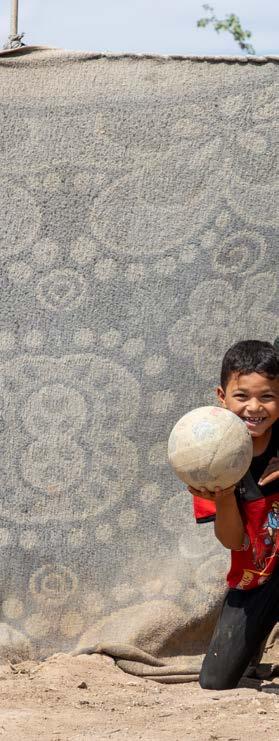
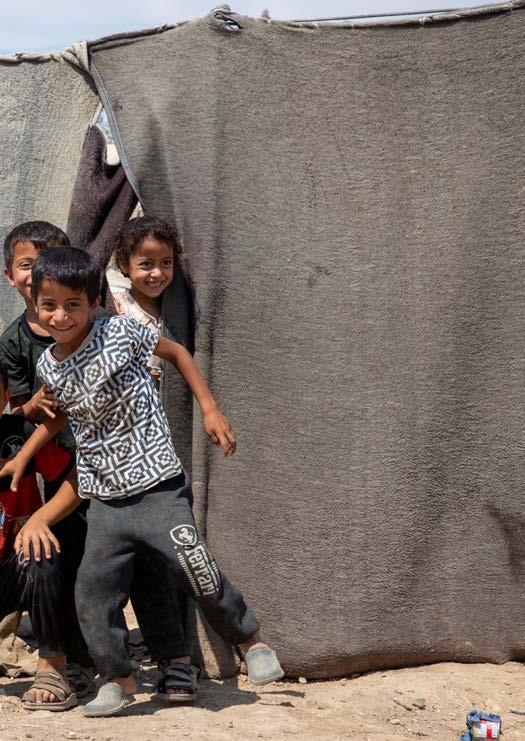
Syria Relief and Development (SRD) was founded in November 2011 in direct response to the Syria humanitarian crisis. SRD is a 501(c)(3) nonprofit organization headquartered in the United States with offices in Syria, Turkey, and Jordan, and has worked to provide aid for over a decade to Syrians affected by violence, poverty, hunger, and displacement. The volatile situation in Syria has created a dire need for food security, shelter, protection, and health care, among others. SRD works to address these needs through comprehensive and integrated programs within Syria and in neighboring regions.
To provide crisis humanitarian relief and plant the seeds of sustainable development for the people of Syria.
To maintain humanitarian relief and mobilize resources to develop a comprehensive agenda for sustainable development in Syria.
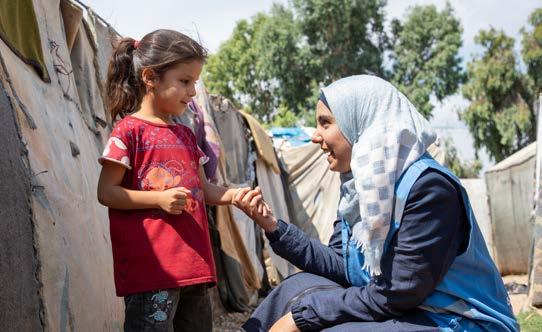
18 million humanitarian interventions since 2011 more than
2023 IMPACT:
852,030 beneficiaries in 2023
605,357 Health care beneficiaries
6,439 Education beneficiaries
217,220 Protection & Empowerment beneficiaries
108,947 men
364,360 women
378,723 children
12,870 Nutrition beneficiaries
7,863
Shelter & NFI
2,281 Seasonal Distribution beneficiaries
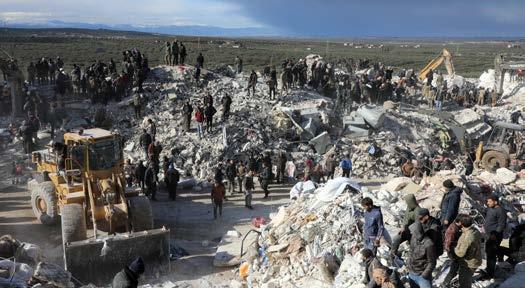
The February 6, 2023 earthquake devastated Northwest Syria, exacerbating existing conflict-induced hardships and worsening dire humanitarian needs among marginalized populations enduring armed hostilities. The quake inflicted extensive material damage, destroying hundreds of homes, facilities, schools, and hospitals, while disrupting essential infrastructure services. A year later, its lingering effects persist, underscoring the enduring impact on the region.
The true extent of the suffering is known only to those who experienced it firsthand and remains palpable to this day. According to the Syria Response Coordinators team, recent statistics regarding the tragedy reveal the following: Over 334,000 households were affected, displacing more than 311,000 individuals, with women and children comprising 67% of this demographic. Tragically, 4,256 civilians lost their lives, and 11,774 others sustained injuries. Furthermore, the toll on humanitarian workers surpassed 255 individuals.
In response, organizations initiated comprehensive efforts to aid those affected. These efforts included search and rescue operations, debris removal, temporary shelter provision, urgent medical assistance, distribution of vital supplies, and support for mental and social well-being. Challenges persist over a year since the earthquake, as humanitarian needs rise amidst dwindling support. In the health sector, funding shortages threaten facility operations, exacerbating the strain on already stretched resources. Food insecurity affects 82% of the population, worsened by a 50% reduction in funding for assistance. Education faces setbacks, with over 1 million school-aged children out of school and widespread mental distress among children, teachers, and education workers. Urgent humanitarian intervention is needed in earthquake-affected communities, with thousands remaining displaced and in need of assistance.1




Since its establishment in 2011, SRD has upheld a comprehensive and interdisciplinary approach to healthcare. Our strategy integrates community health programs into a resilient multilevel network, ensuring attention to all medical care tiers. Neglecting any level of care – primary, secondary, or tertiary – can profoundly impact societal cohesion.
The community's vitality relies on the well-being of its population. In 2023, over 15.3 million individuals urgently needed life-saving health assistance, a notable increase from the previous year.2 SRD operates amid numerous challenges, including attacks on healthcare facilities and personnel, affecting accessibility, security, and quality of health services across Syria.
Despite these challenges, SRD remains committed to providing accessible, high-quality healthcare services. Recent events, such as an earthquake and a cholera outbreak, emphasize the necessity of our integrated approach in addressing immediate health crises. Moving forward, SRD will continue resilient efforts to deliver holistic healthcare solutions to vulnerable populations in Syria.
605,357 services provided to
65,985 men 2
259,727 women
279,645 children

SRD strongly emphasizes providing healthcare services for men, women, and children, utilizing both fixed and mobile primary healthcare units. Our goal is to prevent and effectively manage acute and chronic conditions. Through a wide range of interventions, including outpatient care, immunizations, management of communicable and non-communicable diseases, community health initiatives, mental health support, and infection prevention and control, SRD proactively addresses health needs and promotes overall well-being within the communities it serves.
To ensure that individuals receive the necessary care and support at every stage of their medical needs, SRD-supporting hospitals maintain their dedication to delivering secondary and emergency services to patients, which include life-saving surgeries and care for women facing labor complications. Furthermore, they offer Specialized Services, such as tuberculosis management and dialysis for patients with chronic kidney disease.
The referral system stands as one of SRD's core programs, facilitating prompt emergency transport via a fleet of ambulances and skilled paramedics to ensure swift access to appropriate medical facilities. This service has proven crucial, especially in conflict settings and during recent earthquake responses. Our referral network establishes connections with over 194 facilities in northwest Syria, capable of receiving emergency patients. Moreover, we extend transportation services for cold and emergency cases, catering to individuals lacking access to their own means of transportation.
The SRD SRH program is dedicated to providing comprehensive sexual and reproductive health (SRH) services, which includes implementing the Minimum Initial Service Package (MISP) as an initial response to a crisis. Our focus is on preventing sexual violence, addressing survivor needs, reducing maternal and newborn morbidity and mortality, and delivering emergency obstetric and newborn care. Furthermore, our services prioritize the prevention of unintended pregnancies, ensuring that individuals have access to essential healthcare and support to make informed decisions regarding their sexual and reproductive health
PRIMARY & MENTAL
HOSPITALS & CENTERS
REFERRAL SYSTEM
20 Mobile & Static Clinics
516,898 services provided
1 Mental Health Initiative
2,309 services provided
4 Maternity Hospitals
15,464 Trauma Consultations 18,567 Hospital Admissions 1,984 Major Surgeries
1,345 Minor Surgeries
11,428 Vaginal Deliveries
1,683 Cesarean Deliveries
2
Dialysis Facilities
725 services provided Tuberculosis (TB) Center
23 Ambulances
8,390 cases transported
2,342 services provided Immunizations
Referral Desks
29,591 services provided
166,476 administered
16 Cold Case Vehicles
3,984 cases transported
SRD recognizes the critical importance of Infection Prevention and Control (IPC) in maintaining safe health service operations and minimizing the risks of infectious disease transmission. Since 2019, in collaboration with the World Health Organization (WHO), SRD has been proud to establish a unique IPC program in northwest Syria. This initiative involved conducting necessary needs assessments, developing Standard Operating Procedures (SOPs), providing comprehensive building capacity for medical staff, supporting supervision and monitoring activities, and ensuring the procurement of essential equipment and supplies. In addition to initiating the only Bacteriology lab in northwest Syria to prevent healthcare-associated infections (HAIs).
This program played a vital role during the response to COVID-19 and the cholera outbreak, underscoring its significance in safeguarding public health. Moving forward, SRD is committed to further enhancing and expanding this program to become a cornerstone in health response efforts throughout Syria, ensuring the continued protection of healthcare workers and patients alike


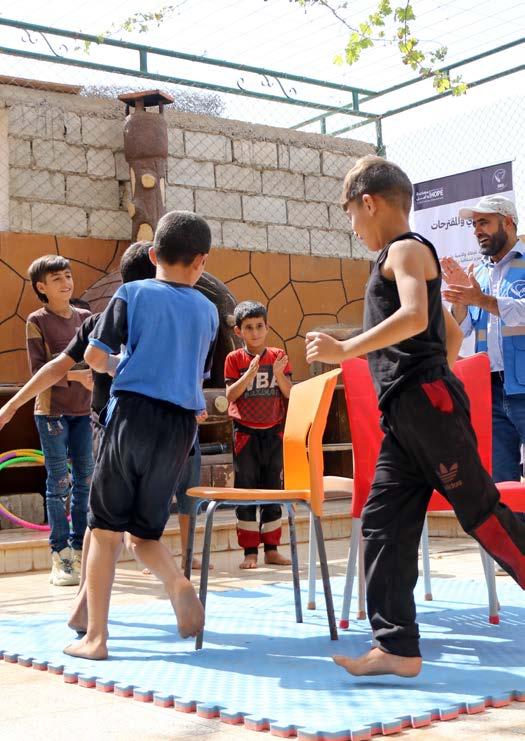

The conflict in Syria has profoundly impacted every individual, with over 15.1 million people requiring protection assistance in 2023.3 Civilians, including men, women, and children, remain vulnerable to hostilities, particularly along conflict lines, resulting in casualties and forced displacement. Protection efforts extend beyond physical safety to encompass the emotional and psychological well-being of those affected by the conflict.
Urgent physical protection requirements include shielding individuals from aerial bombardments, armed hostilities, sexual and genderbased violence (SGBV), environmental threats, and other factors exacerbating negative health outcomes. Equally critical are emotional and psychological protection efforts, necessitating a comprehensive approach to address the diverse needs of affected communities.
Gender-based violence (GBV) is on the rise in Syria, impacting women and girls' coping mechanisms and resilience. Children, especially, bear a heavy burden in the crisis, facing violence, abuse, and exploitation. SRD's protective measures focus on three key areas: general protection, gender-based violence, and child protection. These initiatives underscore our commitment to fostering a safer environment and safeguarding the well-being of those enduring the repercussions of the crisis.
217,220 services provided to
38,427 men
94,936 women
83,857 children
Adolescent Mothers Against All Odds (AMAL) Initiative was designed to meet immediate needs of pregnant adolescents and first-time mothers in crisis settings, while addressing community consciousness around gender, power and social norms. The program was developed by SRD, CARE, and UNFPA. Other adolescent-centered approaches include the Young Mothers Club and Young Fathers Club.
Individual Protection Assistance (IPA) programs entail a one-time cash or non-cash assistance to persons with specific protection needs to prevent their exposure to further risks.
Women and Girls Safe Spaces (WGSSs) allow women and girls to safely socialize and rebuild their social networks, receive social support, acquire skills, and access safe and non-stigmatizing GBV response services along with information on issues related to rights, health, and services.
Income-Generating Activities (IGA) activities work to empower and support women to establish new businesses by providing them with the necessary training, tools, and equipment.
Early Childhood Development (ECD) initiatives like Ahlan Simsim4 provide psychosocial support services to children and families and facilitate child protection measures.
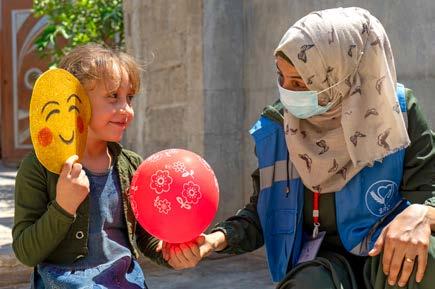
1,353 Dignity Kits
4,277 Recreational Kits
Kit Distributions
4

7 Community Centers + Child-Friendly Spaces
9,981 beneficiaries
2 Adolescent Mothers Against All Odds facilities AMAL
5 Women/Girls Safe Spaces
8,892 beneficiaries
2,276 Young Mothers Club participants
12 GBV & Protection Mobile Sites
198,347 beneficiaries
269 Health providers attended Social Analysis and Action Approach sessions
16,214 beneficiaries Awareness Sessions
PSS Services
Referral Services
Child Protection
7,728 participants
1,578 Community members attended Social Analysis and Action Approach sessions
89,163 beneficiaries
49,413 beneficiaries
24,036 beneficiaries Psychological First Aid Case Management
Women and Community Support Network
2,334 beneficiaries
58 beneficiaries
Education remains a severely neglected sector in Syria, with significant implications for the youth, future workforce, and those thrust into the role of primary breadwinners due to the conflict, especially women and children. An alarming 6.9 million children and education personnel require emergency education services. Moreover, over a million children are out of school, and 1.6 million are at risk of dropping out due to declining international assistance and reduced local resources.5
To address the education gap in Syria, SRD offers vocational training to beneficiaries and provides essential education to humanitarian aid workers in the health, protection, and early recovery sectors. Our approach involves providing informal and formal education initiatives to equip individuals with the necessary tools and resources to overcome short- and long-term challenges. By prioritizing education, SRD aims to empower individuals, foster resilience, and contribute to rebuilding efforts in Syria.
5 Syria Humanitarian Needs Overview (HNO)




Syria faces a complex challenge of malnutrition, characterized by rising levels of chronic malnutrition, increasing acute malnutrition, and emergency levels of anemia among children and women of reproductive age. Approximately 5.9 million people, including 3.75 million children and 2.1 million women, required nutrition interventions in 2023. One in four Syrian children under the age of five experienced stunting, putting them at risk of irreversible harm to their physical and cognitive development, recurring infections, developmental delays, disabilities, and mortality. Additionally, approximately 25 percent of children under five suffer from anemia.
Pregnant and lactating women also bear a significant burden, with 544,752 experiencing moderate acute malnutrition (MAM), including 460,124 suffering from anemia. Essential interventions such as ready-toeat therapeutic foods and infant and young child feeding (IYCF) programs targeting pregnant and lactating women and their children are crucial for addressing the hunger crisis and mitigating its devastating impacts on vulnerable populations.
12,870 services provided to
20 Nutrition Centers (2 Static, 18 Mobile)
3,298 women
10,393 Malnutrition Screenings
9,572 children
1,355 Awareness Sessions
797 IYCF Consultations
325 Pregnant & Lactating Women and Caregivers Micronutrients provided to:
In 2023, an estimated 5.7 million individuals required shelter support, with the earthquake further exacerbating the urgent need for NonFood Items (NFI) assistance. In response to this critical situation, our organization has launched the distribution of essential NFI and tents to facilitate access to vital amenities for affected families. These NFI packages include hygiene kits containing items such as soap and shampoo, along with winter essentials like blankets, heaters, mattresses, and firewood. Through these concerted efforts, our aim is to uphold dignity and alleviate the hardships faced by affected communities by improving their living conditions during challenging times.
2,281 NFI services delivered to
588 men
700 women
574 Households received winterization assistance
993 children


In 2023, the food security crisis in Syria deepened, with approximately 15 million people, constituting 68% of the population, requiring food and agriculture assistance. Among them, at least 12.1 million were food insecure, including 2 million individuals in camps facing severe food insecurity. Another 2.9 million were at risk of food insecurity, underlining the critical need for immediate intervention. SRD reaffirms its commitment to addressing this fundamental human right to access nutritious food.
Continuing its dedication to supporting displaced populations and host communities affected by the crisis, SRD conducts annual seasonal initiatives. These efforts include distributing essential food and nonfood items and assisting during challenging times like earthquakes. Notably, the Ramadan campaign in 2023 provided families with kits containing critical food items and warm meals, along with hosting festive celebrations for children during Eid and distributing Udhiyah meat.
7,863 services provided to
1,985 men
2,320 women
3,558 children
747 Families received Udhiyah/Qurbani Meat Distributions
688 Families reached through the 2023 Ramadan Earthquake Relief campaign


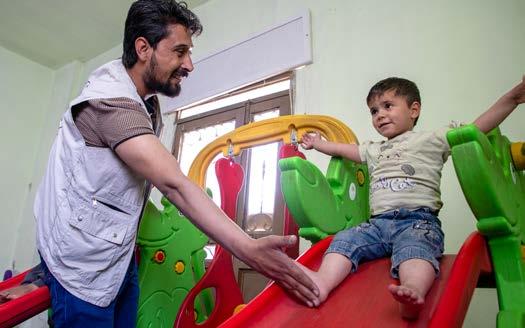
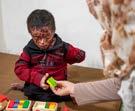

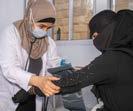
An 11-year-old boy, A.Kh.,lives in northern Aleppo and faces physical disabilities, skin disorders, and malnutrition. A.Kh. finds himself confined at home, unable to attend school due to his condition. His mother, struggling with his worsening health and financial strain, seeks help from the parenting skills team at SRD. A referral to the case management team led to a comprehensive assessment and intervention plan, providing medical, psychological, and educational support. Armed with these resources, A.Kh.'s family now is able to provide him with the care he needs. A.Kh. now attends school as a healthy and happy boy.
In a camp in the Salameh area, Mustafa (4) and Fatima (5) have been forced to endure harsh living conditions in tents and lacking basic amenities, exacerbated by their father's frequent absence and low income. Raised within a large family unable to secure the means to support Salameh and Mustafa, SRD provided support by registering them as high-risk cases and providing essential assistance, including relocation to a safe center, medical care, and emotional support. Efforts are ongoing to reunite them with their mother.
Ms. Bushra, living in difficult circumstances in Harim, Idlib, sought medical help at Al-Salam Hospital due to severe bleeding during her pregnancy. The hospital staff diagnosed her with a non-viable pregnancy and performed necessary medical procedures, including a Manual Vacuum Aspiration. After receiving medical and psychological support, Ms. Bushra expressed her gratitude, “I had lost hope of surviving, and I thank them for their kind treatment and quick response.”
Fiscal Year 2023